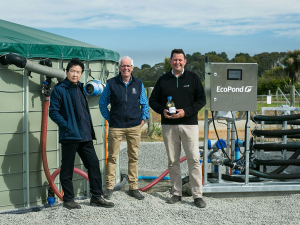Wired for Science: Understanding the feeding habits of mealybug
Fussy children might be frustrating, but fussy mealybugs could help protect the New Zealand wine industry from grapevine leafroll-associated virus 3.
 From left to right Professor Hong Di (LU), Emeritus Professor Keith Cameron (LU), Carl Ahlfeld (Ravensdown). Photo Credit: Ravensdown.
From left to right Professor Hong Di (LU), Emeritus Professor Keith Cameron (LU), Carl Ahlfeld (Ravensdown). Photo Credit: Ravensdown.
Two Lincoln University scientists, Emeritus professor Keith Cameron and professor Hong Di, have delivered a breakthrough technology with immediate benefits for the dairy farming sector to combat climate change.
Developed in partnership with Ravensdown, the new technology is an effluent treatment system that reduces the methane emissions from farm dairy effluent ponds by up to 99%.
Launched to market by Ravensdown and Lincoln University on 10 November under the brand name EcoPond, the new treatment system also slashes the amount of E.coli in the treated effluent, reduces ammonia emissions, mitigates odour and cuts phosphate leaching losses from effluent areas into waterways by up to 90%.
Cutting greenhouse gas methane emissions has been a focal point of the recent COP26 climate summit in Glasgow, with New Zealand joining more than 100 countries pledging to reduce methane emissions by 30% over the next decade.
The EcoPond system achieves its highly significant reductions in methane emissions by adding a treatment agent iron sulphate, a safe additive used in the treatment of drinking water, to effluent ponds. Both professors hope that the greenhouse gas mitigation delivered by EcoPond will be a gamechanger for dairy farmers.
“Nearly all dairy farms use effluent ponds, which are the second-largest source of on-farm methane emissions, after cow belching,” says Cameron.
“Our development and demonstration of the new system, undertaken at the Lincoln University Research Dairy Farm, has proven that the new system is enormously effective at neutralising the methane-producing process, resulting in a 4 to 5% reduction in an average dairy farm’s overall methane emissions.
“This is hugely significant for the industry, as it provides farmers with a new tool in their toolbox to help reduce methane emissions on farm.”
EcoPond can be easily retrofitted into a farmer’s existing effluent system.
“As far as the farmer is concerned, it’s ‘plug and play’. EcoPond is doing the business while the farmer is busy milking the cows,” says Cameron.
Di says they discovered EcoPond’s efficacy in reducing greenhouse gas emissions during the development phase of their earlier award-winning ClearTech system.
“In testing the ClearTech system for unintended consequences we found that the gases we collected off the effluent in experimental set-ups indicated a reduction in methane emissions of greater than 90%.
“This was a stunning result. In science, it’s rare to achieve such a large influence on an experiment.
“So, encouraged by this finding, we tested the system using farm-sized effluent storage tanks and nervously waited to see what would happen. The result exceeded our wildest hopes, achieving a methane emission reduction of 99.9%. We’re still working on that last 0.1%. We’ll get there!”
Lincoln University Acting Vice-Chancellor, Professor Bruce McKenzie says the development of two such significant and innovative agritech solutions that can be quickly and easily applied on-farm demonstrated the value of collaborative partnerships as a means to addressing some of the world’s most pressing land-based challenges.
“Lincoln University has a long history of driving innovation in the land-based sector and has a distinctive research profile.
“Our reason for being is to discover answers to the most pressing land-based challenges, and we do this by collaborating with industry partners, universities, research centres and iwi to help shape a better, more sustainable world.
“Through our partnership with Ravensdown, two of our most acclaimed researchers have been able to develop pivotal on-farm effluent treatment systems that will have immediate and far-reaching benefits by enabling the dairy farming sector to mitigate one of the key greenhouse gases, methane, while also gaining water quality benefits at the same time.”
Reflecting on the past year, Horticulture New Zealand chief executive Kate Scott says there has been a lot to celebrate.
Ministry for Primary Industries (MPI) Director General Ray Smith is giving a big shout-out to the horticulture sector, especially kiwifruit.
Early forecasts for New Zealand's apples and pears point to a standout season marked by exceptional fruit quality and high pack-out rates.
Tickets are now available for Beef + Lamb New Zealand’s (B+LNZ) Out the Gate, returning from 19-21 May 2026 at Te Pae, Christchurch.
Dairy Women's Network (DWN) is welcoming AgriHealth as a new partner.
Northland Field Days patron Ross Newlove remembers the inaugural field days he attended 40 years ago.

OPINION: Here w go: the election date is set for November 7 and the politicians are out of the gate…
OPINION: ECan data was released a few days ago showing Canterbury farmers have made “giant strides on environmental performance”.